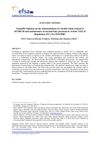TLDR Iron intake has not been proven to maintain normal hair growth.
In 2012, the EFSA reviewed a health claim application suggesting a link between iron intake and normal hair growth in non-menopausal women aged 19 to 49 experiencing hair loss. After evaluating five observational studies and one narrative review, the Panel found the evidence insufficient to establish a cause and effect relationship. Two studies did not adequately exclude confounding factors, two found no evidence of a relationship, and one study that did suggest a link did not control for other factors that could affect iron status or hair loss. Consequently, the EFSA concluded that the claim that iron intake maintains normal hair growth was not substantiated.
 56 citations
,
January 2008 in “Dermatology”
56 citations
,
January 2008 in “Dermatology” Higher iron levels in the blood are not linked to increased hair loss in women.
 207 citations
,
April 2006 in “Journal of The American Academy of Dermatology”
207 citations
,
April 2006 in “Journal of The American Academy of Dermatology” Iron deficiency may be related to hair loss, but there's not enough evidence to recommend iron screening or supplements for all hair loss patients.
 163 citations
,
November 2003 in “Journal of Investigative Dermatology”
163 citations
,
November 2003 in “Journal of Investigative Dermatology” Low iron levels may be linked to some types of hair loss in women.
4 citations
,
January 2020 in “Hair Therapy & Transplantation” Personalized nutrition is more effective for hair loss than generic supplements.
 3 citations
,
May 2016 in “Dermatology Online Journal”
3 citations
,
May 2016 in “Dermatology Online Journal” Changing estrogen levels during menopause might affect genes related to body rhythms and cause increased hair loss.
23 citations
,
March 2016 in “American Journal of Primatology” In female rhesus monkeys, hair gain is linked to reduced stress levels.
 January 2016 in “Journal of clinical & experimental dermatology research”
January 2016 in “Journal of clinical & experimental dermatology research” New methods can diagnose hair loss by examining the scalp and can treat it with a mix of oral and topical medications, along with cosmetic procedures like hair transplants.
 1 citations
,
July 2012 in “EFSA journal”
1 citations
,
July 2012 in “EFSA journal” KF2BL20 does not have proven benefits for maintaining normal hair.
 50 citations
,
August 1999 in “Experimental dermatology”
50 citations
,
August 1999 in “Experimental dermatology” The control system for hair growth cycles is not well understood and needs more research.







